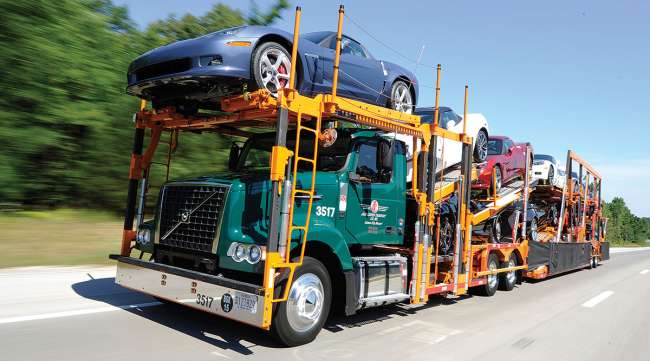Jack Cooper Plans to Reorganize Debt; Auto Hauler Hopes to Avoid Chapter 11

This story appears in the June 26 & July 3 print edition of Transport Topics.
Leaders of Jack Cooper Holdings Corp., North America’s largest auto hauler, are approaching completion of intense negotiations to reorganize a major portion of the company’s debt.
CEO Michael Riggs said in a June 22 interview the situation is highly fluid, and the outcome of the reorganization talks is not guaranteed either way, but he thinks a decision could be made by June 30 that will enable the parent of Jack Cooper Transport to stay out of court. The company said in a press release earlier in June that a Chapter 11 bankruptcy remains a possibility, but as of June 22 no such case had been started.
Riggs emphasized the discussions concern two tranches of publicly traded Jack Cooper debt and nothing else. The larger batch is $375 million worth of Jack Cooper Holdings Corp. senior secured notes paying 9.25% per year. The other group is $58.6 million worth of Jack Cooper Enterprises Inc. senior payment-in-kind toggle notes that pay 10.5% or 11.25%. The JCEI notes are due in 2019 and the JCHC notes in 2020.
JCEI owns JCHC, which owns Jack Cooper Transport. Riggs said his family owns a majority of Jack Cooper Enterprises.
The company is based in Kansas City, Mo., and ranks No. 42 on the Transport Topics Top 100 list of for-hire carriers in the United States and Canada. It also is the largest vehicle hauler on the list.
Company executives have been working with note holders to reach an agreement. As of June 15, 77.4% of the JCHC note holders had reached a definitive agreement with the company, and talks were underway at the time with more debt holders to get to 89.2%.
The company is offering to repurchase notes for cash or cash and stock but at a discount to face value.
Riggs said the company’s goal is to decrease Cooper’s debt levels and “extinguish $300 million in debt.”
The June 15 company statement said the firm is offering to repurchase $1,000 worth of JCEI notes for $150 in cash and other payments. The offer for $1,000 of JCHC notes is to repurchase for $550 in cash and warrants to buy company stock.
Riggs said he wants as much approval for the two offers from note holders as possible by the end of the month. If that does not work out, he said a “surgical pre-pack” in court is a possibility, referring to a prepackaged plan of reorganization where a company goes into a federal bankruptcy court offering a reorganization plan at the same time it is asking for relief.
Such a move, if it comes to pass, would affect only the two tranches of debt in question.
“It wouldn’t change the union deal, the other employees, the suppliers or customers,” Riggs said.
2017 has been an eventful year for Jack Cooper. At the end of March, the company won approval of a contract with the Teamsters union, providing stability through May 2021. The previous labor pact had lapsed 19 months earlier.
Shortly after the labor contract took effect, Cooper announced that Nissan North America would terminate its relationship with Cooper effective in July. As is common among auto haulers, the company’s customer base is very small.
In a filing with the Securities and Exchange Commission, Cooper said in the first quarter this year General Motors Co. made up 45% of revenue, Ford Motor Co. was 34% and Toyota Motor Sales USA was 13%, leaving 8% from all other customers.
Cooper had first-quarter revenue of $161.4 million, on which it produced $5.38 million in operating income. Net interest expense was $12.8 million, or more than twice operating income, yielding a net loss of $6.89 million for the quarter.
The company’s balance sheet, also filed with the SEC, showed assets of $248.8 million on March 31, and total liabilities of $642.2 million, including $477.8 million in long-term debt less current maturities.
Shareholders deficit was $357.4 million.


